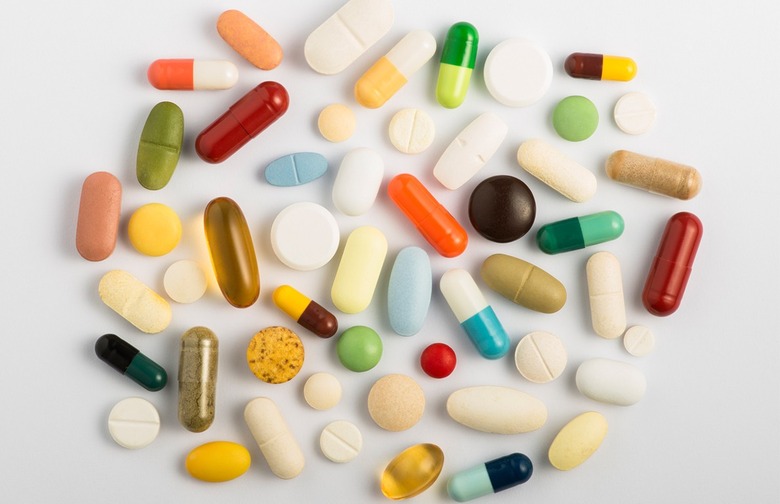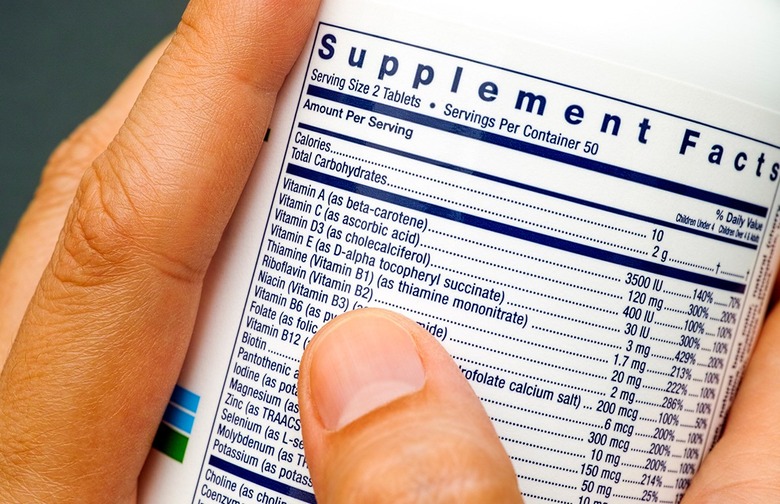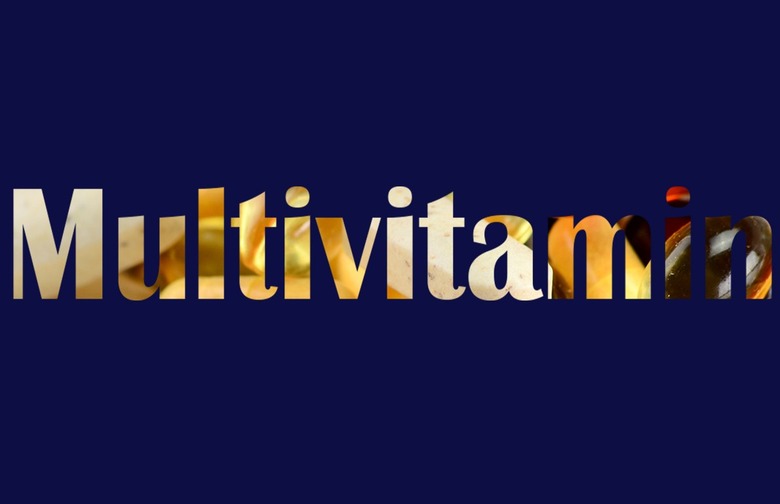15 Things You Need To Know Before You Take A Multivitamin Gallery
Taking a multivitamin can be a smart addition to a successful morning routine — but only if you're doing it right. There are so many multivitamin options at the drugstore. Some are more expensive than others, some claim to ward off certain diseases, and others advertise doctor recommendations and other qualifying factors. Are some multivitamins really better than others, or are they all the same?
Many multivitamins are glaringly similar. But there are some things you should know before you peruse the supplement aisle. For instance, you may not need a multivitamin at all. Or you could be buying the wrong one for your specific needs.
Additionally, according to the research of a couple of consumer organizations, multivitamins aren't always what they seem. While some shoppers probably assume that the labels of these products are informative and transparent, the reality of the situation is that many are misleading — and sometimes even inaccurate.
But by knowing a thing or two about these vitamins before you go in, you can prevent yourself from falling victim to these claims. Here are 15 things every consumer should know before buying a multivitamin.
You Can Overdose on Multivitamins
We know those gummy vitamins are tasty, but be sure you don't eat too many. An overdose of a vitamin can actually cause damage to certain organs, depending on the vitamin in question. Too much vitamin C or zinc, for instance, could cause nausea, hair loss, and nerve damage. Of course, it takes a ton of the vitamin to do real damage. But if you're chronically overdoing it with supplements, you could be harming your health.
Gummy Vitamins Are Missing Certain Nutrients
Relying entirely on gummies for your multivitamin needs is probably not the best idea. Most gummy vitamins — while delicious — are missing one crucial nutrient: iron. There are some industry-wide reasons as to why the nutrient is omitted. But iron is really important for maintaining the health of your blood cells.
Labels Aren’t Always Accurate
Even though the label claims the vitamin provides enough of a certain nutrient, you might not be ingesting that amount with each dose. When Consumer Labs tested individual vitamins for their nutrient content, they found significant differences in the nutrients provided for 46 percent of the vitamins tested. In other words, multivitamins are pretty unreliable; you can't always believe what the label reads.
Multivitamins Aren’t Regulated
Many people don't know this, but multivitamins are not closely regulated by the Food and Drug Administration. They don't undergo product testing and are not monitored for accuracy. These supplements are rarely supported by safety or efficacy testing — these tests are left up to the individual brands' discretion. Most vitamins are safe; but many make health claims that are not well supported.
You Might Not Need One
There is little evidence that people benefit much from taking a multivitamin, especially when a nutritious diet is followed. Most of the nutrients you need should be acquired through food. If you're eating the right foods, in theory you really shouldn't need a supplement.
A Multivitamin Can’t Make Up for a Poor Diet
That being said, a multivitamin cannot suffice for all of your nutritional needs. These vitamins aren't always reliable, and there are some nutrients missing from nearly every multivitamin on the market. The human body is better at absorbing nutrients from actual food than from a condensed vitamin. Plus, fruits, vegetables, whole grains, and other foods contain antioxidant and phytonutrient compounds that are omitted from most multivitamins.
More Vitamins Isn’t Always Better
Even though you're eating more vitamins, you might not be absorbing them. There's a limit to how much of a specific vitamin your body can absorb at one time. For instance, once you ingest more than 200 milligrams of vitamin C, it's unlikely your body will absorb any more. Overloading on vitamins does little for your health.
They Might Not Lower Your Disease Risk
Though nutrition certainly plays a role in the health of your organs and, therefore, your risk of chronic disease, a multivitamin might not be the life preserver you think it is. According to the American College of Cardiology, there is not enough evidence to show that multivitamins (or vitamin and mineral supplements of any kind) are beneficial in preventing heart disease. A study of over 160,000 participants also showed that multivitamin use had little or no impact on the risk of cancer.
Some Have More Sugar Than Others
Is your multivitamin really more of a piece of candy than a healthy supplement? While a couple of grams of sugar probably aren't going to drastically affect your health, it's something to consider, especially if you are living with diabetes or another condition that might be affected. The sugar content of your vitamins is listed on the label.
You Should Always Read the Label
In addition to sugar, there are other added ingredients to be wary of. Fillers such as hydrogenated fats and chemicals meant to sustain vitamins' consistencies are often used in multivitamin production. These common chemical ingredients should all be listed on the ingredients label — peruse this list before purchasing your top choice. Additionally, you should learn to look for the specific nutrients you want to supplement. While one vitamin may contain vitamin C, for instance, another might leave it out. Know what you're looking for before you make your choice.
Labels Aren’t Always Up to Date
The daily value information that must be listed on the labels of multivitamins was updated by the Food and Drug Administration in July 2016. However, companies were given a deadline of July 2019 to update their labels accordingly. These changes weren't insignificant. The daily value for vitamin D, for example, doubled from 400 international units to 800. And though people who supplement vitamin D often overdo it, a deficiency in this nutrient can be serious. So, unless you know they've been updated, take the listed percentages and daily values with a grain of salt.
The Term ‘Multivitamin’ Is Meaningless
While the Food and Drug Administration has regulatory definitions for most products, including everything from milk to margarine, there is no definition of the term "multivitamin." That means, theoretically, that any wide range of products could be given that label without it really meaning anything about the contents or quality.
Not Everyone Needs the Same Vitamins
Due to differences in DNA, lifestyles, and dietary habits, every person's nutrient needs are somewhat different. That's part of the reason why the shelves have so many different subgenres of multivitamins: for men, for women, for kids, prenatal... Women's vitamins will often include more vitamin D and iron, for instance, while men's vitamins tend to contain more of vitamins E and C. There are biological justifications for these differences — but it's best to talk to a medical professional about what your specific needs may be.
The Size of Your Vitamin Matters
According to Consumer Labs testing, some vitamins were more efficiently absorbed than others. A larger pill took longer to dissolve during digestion than a smaller sized pill. Researchers aren't sure exactly how this affects nutrient absorption, but experts suspect that if a vitamin takes too long to dissolve, some of the nutrients may go unabsorbed.
Your Doctor’s Opinion
Before spending an arm and a leg on an expensive multivitamin or other supplements, chat with your primary care physician about which nutrients you may actually need. Depending on the foods you eat and other supplements you're already taking, you may be overloading on certain vitamins by taking the extra tablet. Additionally, you may require other nutrients that your vitamin does not supply. It may not seem worthy of bringing up during your check-up, but there are some very real side effects of not getting the nutrients you need.
More from The Daily Meal:
14 Eating Habits to Lower Your Blood Pressure
50 Foods That Lower Your Risk of Cancer
Small Diet Changes That Will Make a Big Difference














